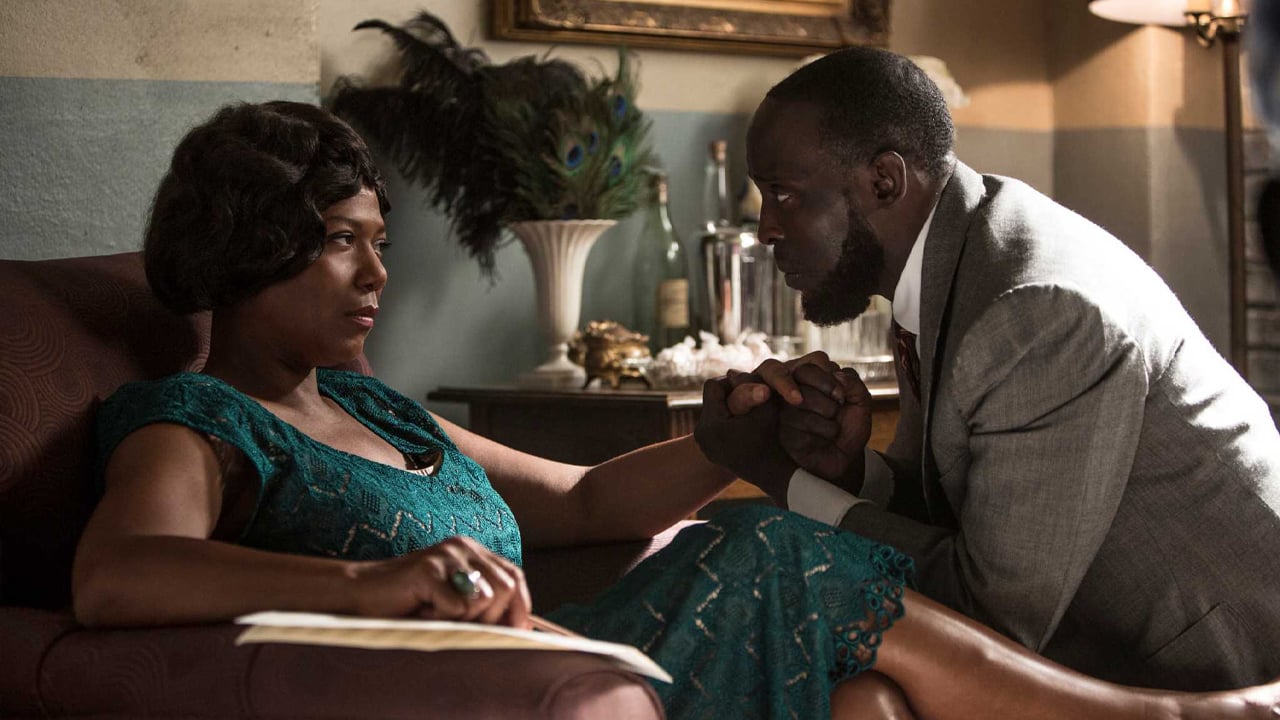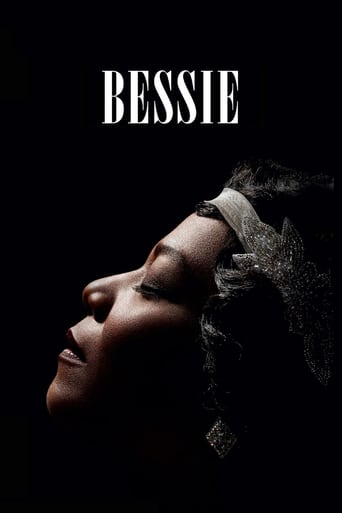



Awesome Movie
Fun premise, good actors, bad writing. This film seemed to have potential at the beginning but it quickly devolves into a trite action film. Ultimately it's very boring.
View MoreIt really made me laugh, but for some moments I was tearing up because I could relate so much.
View MoreExactly the movie you think it is, but not the movie you want it to be.
View MoreA good number of years in the making, Bessie is an HBO biopic chronicling the life of Bessie Smith, aka The Empress of the Blues. Queen Latifah does a fine job not only depicting Bessie's both irascible and generous personality but sings some of her big hits that add to the overall verisimilitude of the film.Bessie's parents died when she was very young so her older sister Viola took over raising all of the younger siblings in the family. There is no evidence however that Viola acted punitively in raising Bessie and that there was this great conflict between them. This is one instance in the film where history was bent in order to perhaps give the story some extra needed conflict.Bessie's relationship to the noted blues singer, Ma Rainey (played convincingly by Mo'Nique), also was altered somewhat to perhaps give the narrative a little more spice. In reality, Bessie first became associated with Ma Rainey at the much younger age of 14. There is also little evidence that Bessie and Ma Rainey were at odds with each other and had a falling out over a purported rivalry. Later in the film Ma Rainey is seen to be joyfully dancing to one of Bessie's records and that's consistent with an account from Rainey's accompanist (as noted in the article "How Accurate is Bessie?" by Laura Bradley in Slate Magazine).Bessie's relationship to her second husband, Jack Gee (played by the excellent Michael K. Williams of Boardwalk Empire fame), is fairly accurate, culminating in the true-to-life abduction of Bessie's adopted son by Gee, who left her after Bessie found out he backed a rival singer.There are many more interesting things we find out about Bessie throughout the narrative—I found the scene of her first recording with Columbia Records fascinating as the primitive nature of recording music at that time (Bessie sings into a large drum) is quite apparent. Other scenes prove quite gripping including Bessie being stabbed in her hometown after an argument in a club, her encounter with a racist novelist at an upscale part in New York City as well as Bessie chasing a bunch of Ku Klux Klansmen away from one of her tent concerts down south.Some of the script feels truncated as the film's scenarists provide little buildup regarding a few major events in Bessie's life. I'm thinking how they gloss over how Bessie lost most of her fortune at the beginning of The Great Depression (did she lose a lot of her money in the stock market or was she also over generous with friends?); these are questions I would have liked answered. In addition, there is no context to her decision to adopt her young son, Jack. You never see her talking about adopting the boy—suddenly he appears at the family dinner table, out of the blue.With changing musical tastes, Bessie's popularity dwindled somewhat in the 1930's. It was up to famed producer John Hammond, to arrange for Bessie's big comeback concert and last recordings in NYC. But Hammond was quoted as saying much later on that he was a little disappointed that Bessie declined to sing her trademark blues substituting more popular big band songs of the time.Writer/director Dee Ree's decision not to depict the car crash that claimed the life of Bessie Smith may have been a missed opportunity to clear up a persistent myth about her death promulgated by the likes of such luminaries as playwright Edward Albee in his play "The Death of Bessie Smith." It was Albee's thesis that Smith may have survived the car crash had she been allowed admittance to a nearby "whites only" hospital. The truth of the matter was that Bessie already was severely injured having lost a large amount of blood with part of her arm being severed. In addition, due to the racism of the times, no hospital that catered to whites would have considered treating Bessie, and those at the scene of the crash would not have considering bringing her to one.Bessie is a well-done biopic that captures the life and times of Bessie Smith. Queen Latifah does an excellent job in depicting the positive and negative sides of the famed singer's personality. In the name of dramatic license, some conflict between the characters was invented to enhance the story. Other events feel a bit rushed—although most of events depicted are fairly true to life. Bessie is recommended as it depicts an important chapter in both African-American and American musical history.
View MoreBessie is a nicely produced flick about 'Bessie Smith the singer' with a little suggestion of 'Bessie Smith the person' sprinkled throughout the story. At movies end you don't feel you know something about her outside of her remarkable singing.There are scenes of her rise from rags to riches and the family she tries to make but that's all you get through brief scenes and then it's back to her as a singer.This isn't a bad movie, it's entertaining and Queen Latifah pulls out all the stops as Bessie the singer. But the ending leaves you pretty much where you were when you started the movie as far as Bessie the person is portrayed.
View MoreThe year was 1972 and the challenge for director Sidney J. Furie was how to translate the biography of Billie Holliday into something that had "bite" for the mainstream.He succeeded, in large part by his decision to make the story as much about the music as the personal travails of the famous singer.At the time it seemed the obvious choice. Yet, flash forward 43 years and today the team behind this project, faced with the exact same choice, took the road less travelled.It is not as if Queen L. does not have a set of pipes. After years of appearing in a string of "commodity" lifetime/lifestyle/X-mas movies -- in parts which leveraged off her infectious natural sweetness -- she stunned audiences worldwide with her performance of I KNOW WHERE I've BEEN in 2007.(For the record, how perfect was she in that performance?? This reviewer has that song in every mix he owns and never gets tired of it. Her performance was so flawless that she could have won IDOL on that single track alone.) This is a hard film to review. A lot of talent behind the camera, a lot of talent in front of the camera, and all of it hamstrung by the executive decision to downplay the music and focus on the strife.Larger than life people have larger than life problems. But we already knew that. Personally, I missed the tunes.
View MoreA movie about some aspect of Bessie Smith's life is decades overdue, considering the broad cultural shadow she casts. A few episodes of her tumultuous life explored in depth would resonate, but like too many biopics, this one suffers from the creators' attempt to tell the whole story, or most it, and the results are mechanical, predictable and force-fitted into various agendas. Most biopic makers stumble upon these rocks. Their task is difficult. From the start of "Bessie" we are told five things over and over: Bessie was haunted throughout her life by memories of the mother she lost as a child. Bessie had lesbian dalliances. Bessie loved to drink straight gin, preferably right out of the bootlegger's glass jar. Bessie had a violent temper. Bessie was a fiercely independent, take-charge kind of gal. But the main thing about Bessie that is presented only sporadically and by rote is her distinctive singing and how it came to be that way. Queen Latifah, who would seem to be a fine choice for this role, does suggest Smith in girth and even in facial features, but despite a strong voice which she tries to adapt to the Smith groove, she never makes us feel the rafters rising as the Smith legend tells us. The only time she approaches the true Smith sound is near the end when hard living had begun to ravage her vocal chords. And in the early scenes Latifah, given her age and physicality, cannot possibly persuade us that she is a young, unformed artist-to-be.The attempt to demonstrate how she gradually upstaged her mentor, Ma Rainey (played to the hilt by Mo'Nique), is episodic and sketchy, not organic or dramatic; the same goes for the re-enactments of Smith's altercations with members of the high-toned Manhattan art scene in the 1920s and early 1930s. Some good substance is made of her volatile love affairs with men (Michael Kenneth Williams and Mike Epps). But her mid-career slump is presented as with no explanation or cause, other than perhaps the Great Depression. SPOILER ALERT: Her tragic death (a potential movie in itself) is entirely absent, as "Bessie" ends in mid-air, or mid- road, as we are left with her musings about where she will go next after a picnic with her former bootlegger.So, a point has been scored for Bessie Smith. It opens a conversation. But more is needed.
View More